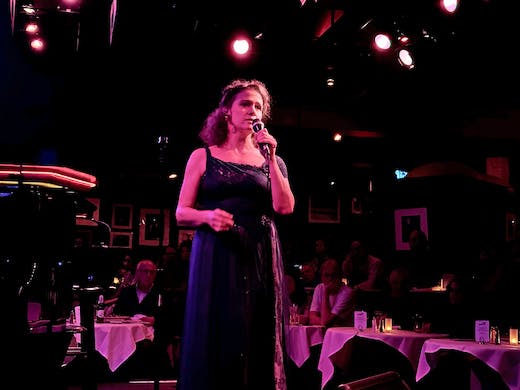Amid the Hopelessness, Maude Maggart Finds the Rainbows
At 48, Maggart is a flawless, high-flying, perennially dreaming avatar representing the very best of this mongrel artform that we, mostly for the sake of convenience, refer to as cabaret.

Maude Maggart
Mabel Mercer Foundation Cabaret Convention
Jazz at Lincoln Center
October 17-19
In one song, “all the world is a hopeless jumble,” while in another, the world simply “falls apart,” but in both rainbows are a balm. This is the music of Maude Maggart, where rainbows and dreams are what hold the world together, and help guide us to the elusive sliver of hope amid the hopelessness.
Ms. Maggart’s celebrations of dreams and dreamers were one of the things that made New York great 10-15 years ago at the old Oak Room in the Algonquin Hotel. Over the last decade, her appearances at Manhattan have been far less frequent, which serves to make them all the more special.
Last year, her duo show with mentor Andrea Marcovicci provided the unofficial coda to the 2022 Mabel Mercer Foundation annual Cabaret Convention; this year, her solo set at Birdland serves as the de facto opening salvo to the three-night festival. She’s also appearing as part of the first night show, “Speak Low: The Music of Kurt Weill,” co-hosted by Ms. Marcovicci and Jeff Harnar on Tuesday evening, October 17, at Jazz at Lincoln Center.
Cabaret singers typically tend to focus on backstory, such as how Irving Berlin or Cole Porter came to write such-and-such a song. Ms. Maggart specializes in front story — what the song is actually trying to say to us — and she reinforces those inner meanings by combining songs on similar topics from widely disparate sources.
She begins with Rodgers and Hammerstein — not together. First, it’s Rodgers & Hart’s “Isn’t it Romantic,” and that’s followed by Jerome Kern and Oscar Hammerstein’s “In the Heart of the Dark.” In both cases, she stresses those aspects of the songs that deal with romantic imagination, and the gap between dreams and reality. To that end, she begins both songs with the verses in rubato, emphasizing their dreamlike quality.
The progression of dreams makes itself concrete in a sequence of songs about lullabies and fairy tales: Her collage of three different takes on Cinderella — Disney’s (“A Dream is a Wish Your Heart Makes”), Sondheim’s (On the Steps of the Palace”), and Rodgers & Hammerstein’s (this time together in “In My Own Little Corner”) — is quintessential Maude.
There are more musical contemplations of fairy tale heroines, including a song called “True Love” that was cut from the Broadway musical “Frozen” apparently because it was too dark for a children’s show — composers Kristen Anderson-Lopez and Robert Lopez were at the table adjacent to mine — but, as Ms. Maggart related, “there’s nothing too depressing for a cabaret show, that’s our jam. Plus, I’m Irish, and that’s our jam!”
From there, she hits upon another recurring theme in her shows, the spiritual presence of Marshall Barer, the songwriter, perennial hipster, and narcotics and sexual experimentalist. She had begun the evening with his “Here Comes the Dreamers” and at the midpoint she delivered “Antigua.” This is an especially trippy tale inspired by Lewis Carroll and set to Antonio Carlos Jobim’s bossa nova “Antigua,” which somehow makes the characters, scenes, and substances of “Alice in Wonderland” seem even more hallucinatory.
Then there’s an acute contrast, from fairy tale princesses and far-flung flights of the imagination to the rich dreams of ordinary people: She melds Judy Collins’s “My Father” with Joan Baez’s “Speaking of Dreams.” She dreams of dancing to the Gypsy Kings in the streets of Paris, which seems appropriate, as she already is dressed as if she just walked out of the first act of “Carmen.”
The “rainbow” sequence follows, in which Yip Harburg’s “Over the Rainbow” leads into his “Look to the Rainbow,” both with verses that delineate the power of rainbows to heal the world. She caps the segment with “The Rainbow Connection,” after an anecdote about Kenny Ascher, the exceptional pianist and Birdland regular who composed the Muppet anthem with Paul Williams. For an encore, it’s back to dreams and Jerome Kern with “I Dream Too Much.”
At 48, Maude Maggart is a flawless, high-flying, perennially dreaming avatar representing the very best of this mongrel artform that we, mostly for the sake of convenience, refer to as cabaret. She’s essentially been spinning variations on these themes for all of the 15 or so years that I’ve been privileged to hear her — dreams, fairy tales, Marshall Barer — and it’s as moving and thought-provoking as ever. She rattles our cages and wakes our sleeping demons, not to mention opening our ears and blowing our collective mind.

